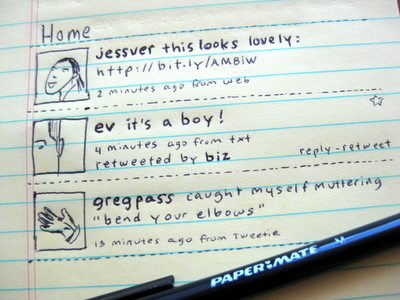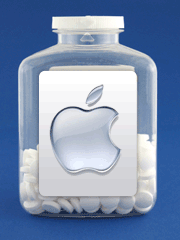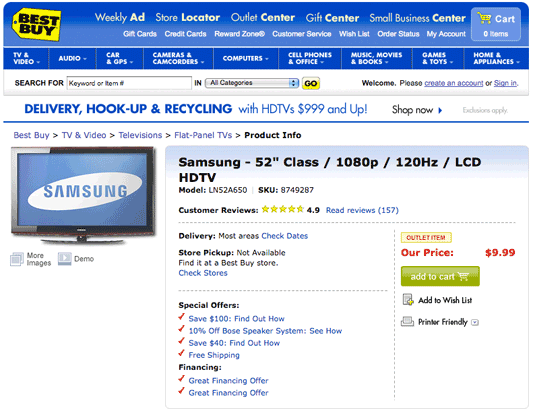 Microsoft has announced that the Zune HD is hitting stores on September 15th at prices that significantly undercut Apple’s iPod Touch, Microsoft has begun showing off the media player to journalists (not me, alas, but those who have seen it are enthusiastic). As before, it’s impressive from a specs standpoint, with 720p video output, HD radio capability, an OLED screen, and potent Nvidia graphics. In short, it’s promising. Does it have a shot at being what no Zune has been before it: a product that sells well enough to provide meaningful competition to the iPod?
Microsoft has announced that the Zune HD is hitting stores on September 15th at prices that significantly undercut Apple’s iPod Touch, Microsoft has begun showing off the media player to journalists (not me, alas, but those who have seen it are enthusiastic). As before, it’s impressive from a specs standpoint, with 720p video output, HD radio capability, an OLED screen, and potent Nvidia graphics. In short, it’s promising. Does it have a shot at being what no Zune has been before it: a product that sells well enough to provide meaningful competition to the iPod?
I can’t provide a fully-baked take on that question until I’ve tried the Zune HD, but the most obvious and daunting challenge it faces is the fact that the iPod Touch piggybacks on the iPhone platform and therefore unlocks access to an amazing array of tens of thousands of applications. The Zune HD, if it lives up to its potential, will be what the iPod Touch was before Apple released the iPhone OS 2.0 software and opened the App Store: a slick media handheld with access to the Web via its browser.
I’m guessing, then, that for many follks who are drawn to the Zune HD’s hardware virtues and aggressive price enough to consider buying it instead of a Touch, the decision will boil down to this: App Store, or no App Store? It’ll be fascinating to see whether enough people don’t care about third-party programs to give the HD critical mass.
Apple has already inoculated the iPod Touch against unfavorable comparisons to the Zune HD to some extent through advertising that’s almost exclusively about the diversity of third-party apps–especially games. And we still don’t really know what the Zune-vs.-Touch comparison will look like, since Apple will almost certainly announce a new iPod Touch in September. It could be a little different from the current model or a major advance. (Side note: I think it would be kinda cool if Apple took the Touch on its own design journey over time rather than keeping it as “an iPhone without the phone”).
Then there’s the question of the Zune name. I sort of admire Microsoft for sticking with it–if nothing else, it shows persistence. The current Zune is a respectable old-school media player itself, but the Zune name feels permanently tarnished. It not only never acquired a tenth of the iPod’s coolness, but came to be associated (at least in the echo chamber of tech pundits) with failure. I still think it would make sense for the company to broaden the not-at-all-tarnished Xbox brand to encompass entertainment on devices of all sorts. But if that’s going to happen, it’s not happening now (even though there is evidence that Microsoft does want to broaden Xbox).
Of course, the best way to make Zune cool would be to release a cool Zune. What’s your take on whether the HD is, indeed, that Zune?
![]() One of the best things about Twitter is that most of the best things about Twitter have been invented by its users. Such as the idea of addressing other people by using their @names and sharing their tweets by retweeting them. Little by little, Twitter formalizes these inventions as part of the service, and a new blog post by Twitter cofounder Biz Stone reports that retweeting is going to become a true feature.
One of the best things about Twitter is that most of the best things about Twitter have been invented by its users. Such as the idea of addressing other people by using their @names and sharing their tweets by retweeting them. Little by little, Twitter formalizes these inventions as part of the service, and a new blog post by Twitter cofounder Biz Stone reports that retweeting is going to become a true feature.

 The Applesphere seems to have stopped debating whether there’s going to be an Apple tablet or not. There even seems to be some consensus about form factor and price range. What’s left to toss around? Release dates. The question seems to boil down to this: Fall/Holiday 2009 or 2010? (As you may recall, we
The Applesphere seems to have stopped debating whether there’s going to be an Apple tablet or not. There even seems to be some consensus about form factor and price range. What’s left to toss around? Release dates. The question seems to boil down to this: Fall/Holiday 2009 or 2010? (As you may recall, we  For today’s T-Poll I’m going to ask you to play Microsoft pundit. (Don’t worry, it’s easy–or at least it’s easy to be just as accurate as the folks who get paid big bucks to do it.)
For today’s T-Poll I’m going to ask you to play Microsoft pundit. (Don’t worry, it’s easy–or at least it’s easy to be just as accurate as the folks who get paid big bucks to do it.) Google’s Gmail has trained a lot of us to think of an inbox as a place with near-instant access to all our e-mail. reMail–an e-mail search application for the iPhone that’s
Google’s Gmail has trained a lot of us to think of an inbox as a place with near-instant access to all our e-mail. reMail–an e-mail search application for the iPhone that’s  ReMail works with Gmail and IMAP e-mail accounts, and begins by downloading all your messages. (It’s estimating that it’ll take about seven hours to download about 13,500 messages from my Gmail account via Wi-Fi.) It compresses messages and trips out formatting and graphics, so a boatload of mail doesn’t take that much space: It estimates that those 13,500 messages will occupy about 88MB, which is practically a pittance on my 32GB phone. And reMail says its search is five times faster than Mail’s.
ReMail works with Gmail and IMAP e-mail accounts, and begins by downloading all your messages. (It’s estimating that it’ll take about seven hours to download about 13,500 messages from my Gmail account via Wi-Fi.) It compresses messages and trips out formatting and graphics, so a boatload of mail doesn’t take that much space: It estimates that those 13,500 messages will occupy about 88MB, which is practically a pittance on my 32GB phone. And reMail says its search is five times faster than Mail’s. I’m happy to report that I’m working with my pals at PC World on some upcoming coverage of Windows 7. One of the great big questions about Win 7 is, of course, whether it’ll convince Windows XP holdouts who avoided Vista (and who are legion) to upgrade. Only one group knows the answer: Windows XP holdouts! So we’ve put together a survey for people who still use Windows XP as their primary operating system. (Don’t worry if you’re not familiar with Windows 7 yet–we still have some questions for you.)
I’m happy to report that I’m working with my pals at PC World on some upcoming coverage of Windows 7. One of the great big questions about Win 7 is, of course, whether it’ll convince Windows XP holdouts who avoided Vista (and who are legion) to upgrade. Only one group knows the answer: Windows XP holdouts! So we’ve put together a survey for people who still use Windows XP as their primary operating system. (Don’t worry if you’re not familiar with Windows 7 yet–we still have some questions for you.) Like 5Words?
Like 5Words?  Microsoft has announced that the
Microsoft has announced that the  The business unit within Microsoft responsible for Mac apps (which Microsoft likes to call the MacBU) is as old as the Mac itself, and it’s never behaved like it had been fully assimilated into the Redmondian Borg. Office for the Mac has long been a distinctly different product from its Windows counterpart–sometimes for better, sometimes for worse. One of the most striking differences has been that Office for the Mac has never offered Outlook; instead, it includes Entourage, a sort-of-like-Outlook, sort-of-different application that got great reviews when it debuted but which has also suffered from iffy compatibility with Outlook and Exchange. It’s also faced increasing competition from within OS X itself, as Apple has beefed up its Mail and iCal apps (and moved to build compatibility with Microsoft’s Exchange server directly into Snow Leopard, the imminent OS X upgrade).
The business unit within Microsoft responsible for Mac apps (which Microsoft likes to call the MacBU) is as old as the Mac itself, and it’s never behaved like it had been fully assimilated into the Redmondian Borg. Office for the Mac has long been a distinctly different product from its Windows counterpart–sometimes for better, sometimes for worse. One of the most striking differences has been that Office for the Mac has never offered Outlook; instead, it includes Entourage, a sort-of-like-Outlook, sort-of-different application that got great reviews when it debuted but which has also suffered from iffy compatibility with Outlook and Exchange. It’s also faced increasing competition from within OS X itself, as Apple has beefed up its Mail and iCal apps (and moved to build compatibility with Microsoft’s Exchange server directly into Snow Leopard, the imminent OS X upgrade). I’m still curious whether Office 2010 for Mac will include integration with the Office Web Apps, and whether it’ll adopt a full-blown version of Office for Windows’ Ribbon interface. (Office 2008 for Mac has a sort of halfway-there version of the Ribbon.) Microsoft didn’t say anything about these questions today. Me, I’d vote for a Mac Office that bore at least somewhat more resemblance to the Windows one, not just for consistency but because Office 2007’s interface is superior to that of Office 2008.
I’m still curious whether Office 2010 for Mac will include integration with the Office Web Apps, and whether it’ll adopt a full-blown version of Office for Windows’ Ribbon interface. (Office 2008 for Mac has a sort of halfway-there version of the Ribbon.) Microsoft didn’t say anything about these questions today. Me, I’d vote for a Mac Office that bore at least somewhat more resemblance to the Windows one, not just for consistency but because Office 2007’s interface is superior to that of Office 2008. For years, the
For years, the  Early this morning, Best Buy had a deal on its site that was not merely a best buy but a mindbendingly, impossibly cheap one: a
Early this morning, Best Buy had a deal on its site that was not merely a best buy but a mindbendingly, impossibly cheap one: a 